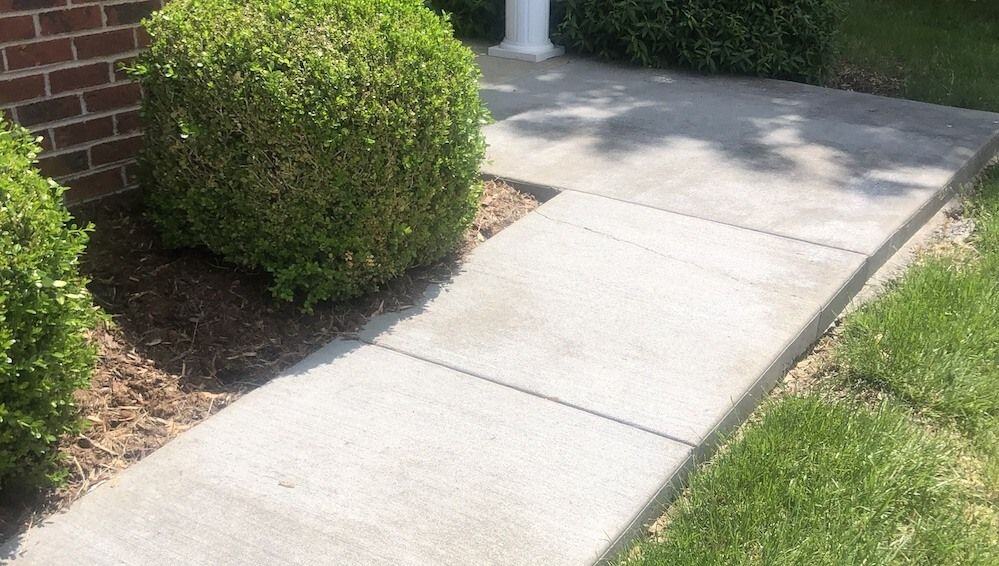Search for topics or resources
Enter your search below and hit enter or click the search icon.
Providing your email address will keep you updated should we need to provide updates specific to your location.

You’re super excited with your brand new, freshly poured concrete, but then you begin to notice small cracks running throughout the concrete.
Disappointment, and maybe fear, set in. Did something go wrong?
The simple truth is that all concrete cracks eventually. And while it’s never fun when the concrete is brand new, it is totally normal to have cracks in new concrete slabs.
In this article, we’re breaking down why new concrete cracks, when you should be concerned about it, and how to fix it if it happens to you.
As the wet concrete cures and dries, it loses moisture and shrinks. This shrinking action causes the concrete to develop small, fine cracks throughout the surface.
Concrete requires a delicate balance of ingredients in the mix in order to cure properly. Too much water added into the mix can cause even more of the shrinkage and cracking to take place.
Rapid or uneven drying can cause even more cracks, so it’s important to pay attention to and accommodate the environment and weather conditions when the concrete is curing.
Hot, dry, and windy weather can cause the concrete to dry too fast and crack more.
Soil is often disturbed and loosened up when new concrete is poured, which means that it will likely settle back down and bring the new concrete on top down with it.
If the concrete slab settles unevenly, it can easily cause it to crack.
As mentioned before, small, fine concrete cracks in new concrete are normal and to be expected.
However, when cracks in your new concrete slab are wider than ⅛”, they can cause problems like these and should be addressed:
Water can enter cracks, freeze, expand, and cause the new concrete cracks to worsen throughout continuous freeze-thaw cycles.
Water can seep down into the cracks and access the steel rebar, causing it to rust and expand, deteriorating the concrete from the inside.

Cracks in new concrete that are less than ⅛” wide are generally okay being left alone. In fact, repairing them may make them more noticeable.
However, if water can seep into the cracks and cause damage as discussed in the previous section, you’ll need to repair the cracks.
To repair new concrete cracks, fill them with flexible concrete caulk. This will seal them off from water and minimize the chance of them getting worse.
You may have to use a grinder to widen the crack enough for the concrete caulk to sit down within the crack properly.
Related Resource: How To Fix Cracks in Concrete
Hairline cracks are normal in new concrete. As the new concrete settles, thin hairline cracks open up. While they are usually very thin, they can run very deep in the slab.
Minor concrete cracking should be expected when new concrete is poured.
New concrete can crack within just hours of being poured, and it can crack at any time throughout its life.
If your new concrete is cracking, chances are the cracks are minor and don’t require repair. Small, thin cracks usually won’t cause any problems and are better left alone.
However, if your new concrete develops cracks more than ⅛” wide, it’s better to seal them off from water with a high-quality concrete caulk so they don’t get worse.
You can repair cracks yourself, or hire a professional to caulk the cracks. Getting professional advice will also help determine whether repair is really necessary.
A-1 Concrete Leveling has been repairing and maintaining concrete nationwide for over 30 years. If you’d like to know what A-1 can do for your concrete, find your nearest location to request a free estimate!
Sarah Etler joined A-1 Concrete Leveling after receiving her Bachelor of Arts degree in English from Northern Kentucky University. As A-1's Content Marketing Manager, she works closely with industry experts to produce content that will best answer questions related to concrete repair and maintenance practices. Sarah loves living a life full of discovery and is excited every day to see what new things she can learn and share with those around her.
Topics: